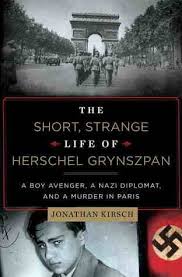Jewish Literary Links for Shabbat

Shabbat shalom.

Shabbat shalom.

Shabbat shalom.
 As eagerly as I anticipated the publication of Jonathan Kirsch’s The Short, Strange Life of Herschel Grynszpan: A Boy Avenger, a Nazi Diplomat, and a Murder in Paris this spring, I knew right away that I wouldn’t be able to review the book. That’s because I’ve had the great pleasure of getting to know Jonathan over the past few years, primarily through my work writing reviews for The Jewish Journal, where Jonathan is Book Editor. My abilities to be “objective,” notwithstanding, the apparent conflict is obvious.
As eagerly as I anticipated the publication of Jonathan Kirsch’s The Short, Strange Life of Herschel Grynszpan: A Boy Avenger, a Nazi Diplomat, and a Murder in Paris this spring, I knew right away that I wouldn’t be able to review the book. That’s because I’ve had the great pleasure of getting to know Jonathan over the past few years, primarily through my work writing reviews for The Jewish Journal, where Jonathan is Book Editor. My abilities to be “objective,” notwithstanding, the apparent conflict is obvious.
But I knew, too, that I could count on the book being a superb read, one that I’d want to share with others. As soon as I finished it (I was right–it’s excellent), I sent some questions to Jonathan. Those questions, and his answers, can be found below. (more…)
Whatever the reason, I can’t understand why some writers seem so intent on distancing their work from being identified as “Jewish.” That they do so while simultaneously benefiting from the “label” and showing no evidence of suffering from any career-stultifying “ghettoization” only adds salt to the wound.
From an essay of mine just published on JewishJournal.com.
If you follow me on Goodreads, you know that not long ago, I was reading George Eliot’s Daniel Deronda.
Today’s edition of Jewish Ideas Daily features some reflections on that reading.
In the beginning, there was Theodor Herzl. Or so I thought. I have a Ph.D. in European history, but I have long been aware of the deficiencies in my knowledge of Jewish history and my Israel literacy. So when I discovered the opportunity to take a non-credit course on Zionism here in New York, I jumped at the chance.
Once enrolled, I learned just how much Zionist history there was before Herzl. Our initial sessions were devoted to a variety of Zionist forerunners and an extensive documentary legacy that anticipated Herzl’s visionary 1896 pamphlet, The Jewish State.
I was dutifully taking notes during our second class meeting when our professor mentioned another text that expressed Zionist sentiments well before Herzl took up his mission. But unlike the writings of Rabbis Yehuda Alkalai and Zvi Hirsch Kalischer, or those of Leon Pinsker and Ahad Ha’am, this text was written in English, and by a woman who wasn’t even Jewish. Somewhat surprisingly, it wasn’t a polemic or a pamphlet. It was a novel by George Eliot (the pen name of Mary Anne Evans), Daniel Deronda, published in 1876, 21 years before Herzl convened the First Zionist Congress.
To read the rest of my essay, please click here.